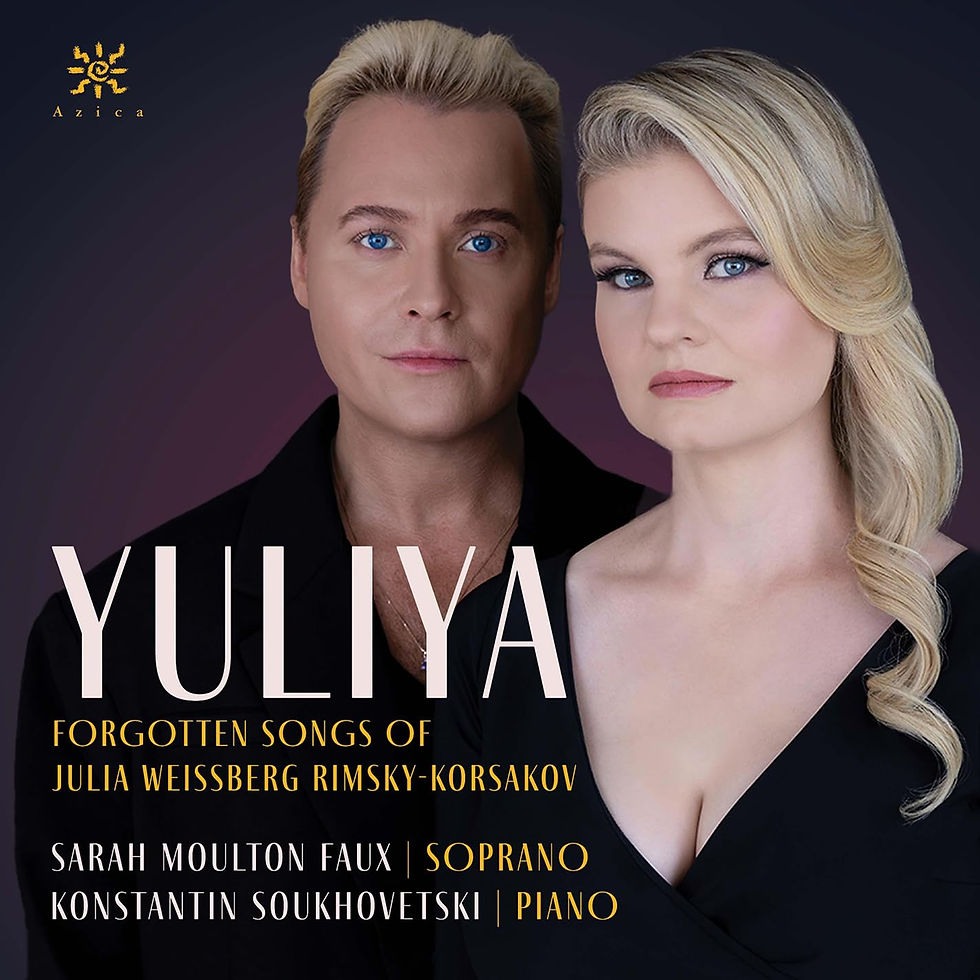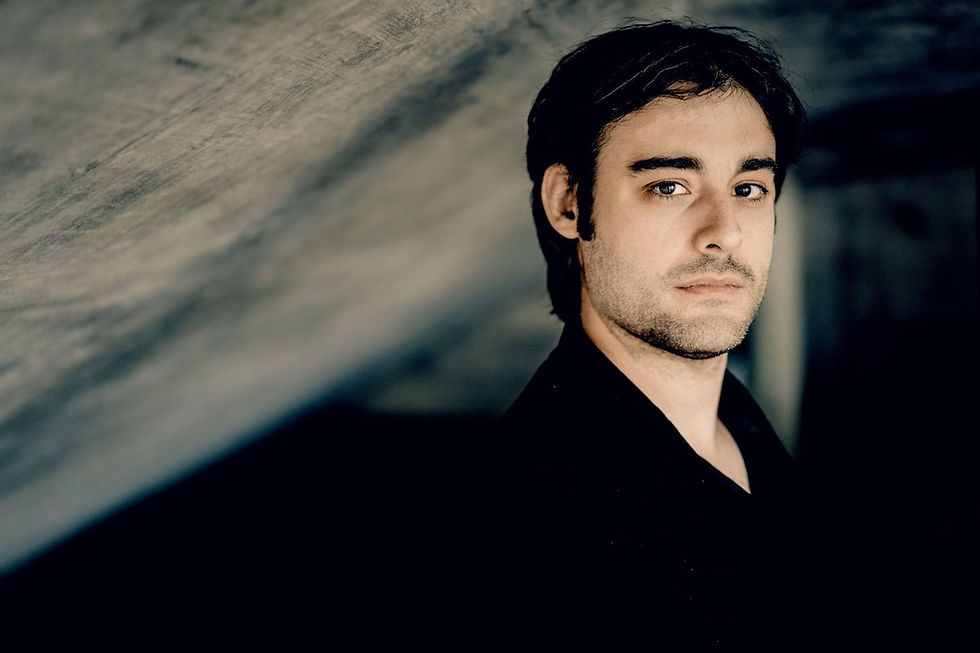Jewish identity in music – pianist Elisaveta Blumina explores Mieczyslaw Weinberg
- Dec 28, 2016
- 4 min read
Updated: Jun 10, 2020

Multilingual, with a vivid personality and eyes that bare her soul, the prodigal pianist born in St. Petersburg (Leningrad at the time), has built her career as performance and recording artist in Germany and beyond, and serves as artistic director of the Hamburg Chamber Music Festival since 2012. (Photo Credit: Frances Marshall)
When it comes to new discovery, Blumina’s creativity as curator and performer unite, combining skilled professionalism with passionate investigation and expression. In a highly idiosyncratic manner, she follows her instincts and curiosity. Certainly such passion is grounded in her deep motivation to express diverse musical facets, which, like little puzzle pieces put together, are larger than the sum of their meaningful morsels. Time after time, she closes the gaps, shedding as much light on her finds, as on own identity as woman artist of Jewish heritage.
Growing up in a family of Holocaust survivors, yet in an environment rooted in high brow culture – the Russian school of piano, which dominated the St. Petersburg conservatory and idolized Germany’s music tradition – certainly left a strong emotional imprint on her personal and musical identity.
At age 19, Blumina moved to Hamburg all by herself to advance her piano studies, and there was no looking back. Several years in Florida followed, where her older son was born, then Rome, Geneva, and Madrid, where her younger son was born, and finally Dublin, where she spearheads a music school. Among her teachers she counts Andrἁs Schiff, Evgeny Koroliov, Radu Lupo and Bruno Canino.

While Blumina’s multifaceted pianistic interests include repertoire that ranges from Russian masters and moderns, to Brahms, to French music – her 2014 CD with the Ensemble Blumina Trio (with Kalev Kuljus, Oboe, and Mathias Baier, Bassoon) features works of French chamber music from the 20th and 21st centuries and garnered the Echo Price of that category – it became her passion to help composers who had remained unjustifiably unknown to the public, be heard anew.


Perhaps none of Blumina’s efforts, though, has taken on such panoramic volume and broad follower-ship than her rediscovery of Polish-Jewish composer Mieczyslaw Weinberg. With her continued championship of Weinberg’s brilliant work, Blumina has managed to play a central role in a recent perpetual Weinberg Renaissance. And her enthusiasm is contagious. Blumina was in New York when Weinberg’s work was first brought to her attention in 1995 by Russian Cellist Yosif Feigelson, who had already recorded some of Weinberg’s works.
It was then she realized she had been familiar with Weinberg’s music all along, as had most everybody growing up in Russia at the time, through his compositions for films including the beloved cartoon Winnie the Pooh. Upon further research, she was surprised to find that this favorite melody from her childhood was just one of sixty-five film scores Weinberg produced next to his prolific output of twenty-six symphonies, seven concertos, seventeen string quartets, twenty-eight sonatas for various instruments, seven operas and ballets and various other works, including a requiem and countless songs.
Sixteen albums of Weinberg’s music were released on the Olympia label between 1994 and 2000, many of them releases of Soviet-era recordings of live premiere performances; this recorded repertoire gives a representation of the composer’s oeuvre, alas with differing recording qualities (Reilly 2000). An important force behind these recordings was Tommy Persson, and subsequently releases on the Chandos label followed. When Blumina started to explore the substantial musical material, she fell in love with his Children Note Books, I-III, Op. 16, 19, and 23, consisting of 23 pieces for piano, which had been written in 1944 for his daughter Viktoria.
Just recently, Blumina had a chance to meet with Viktoria in person in Israel, where she had emigrated with her mother Nataliya (Weinberg’s first wife) in 1972. The meeting was momentous, remembers Blumina: “An important personal connection for me was the fact that perhaps the most beautiful of Weinberg’s works, which also incidentally started my big recording project with CPO, was dedicated to her.” Blumina had the opportunity to interview Viktoria in her native Russian language, hearing about her close relationship with her father, and her memories of listening to her father’s compositions before they were played through for his close friends: Dmitri Shostakovitch, Boris Tschaikowski and Volik Bunin. Viktoria used to add the page numbers by hand into her father’s manuscripts, and she accompanied him to rehearsals of his new works. Music remained in the forefront of Weinberg’s daily routine, just like it had dominated his youth in Warsaw, where his father practiced violin and composed for a Jewish theater company, he also conducted. (photo: Deutschland Radio Kultur, Berlin)

“His music is overflowing with Jewish spirit and sentiment, and his melodies carry in them the essence of Jewish pain and melancholy,” says Blumina, who, several years ago, began a series of recordings for the CPO label which upon completion will span Weinberg’s complete collection of Solo Piano and some of his Chamber Music works. “Once I started to occupy myself with his work, I realized I just had to go deeper and deeper. His work is full of individual idioms, diverse and multifaceted, it just did not let me go.” Others feel equally engaged after making the acquaintance with Weinberg’s talent. Star violinist Gidon Kremer once thanked Blumina personally for having infected him with her “feverish passion” for the composer, and since has performed Weinberg on a regular basis. In 2015, he and rising star pianist Daniil Trifonov put Weinberg on Carnegie Hall’s stage. This season under the title: “Masks and Faces,” Kremer and his exalted Baltic chamber group, Kremeratica, will present works by Weinberg, Tschaikovsky, Mussorgsky and Arvo Paert at New York’s 92Y, during his US tour, placing Weinberg’s presence firmly within Russia’s artistic heritage. (photo: Gidon Kremer with Elisaveta Blumina, courtesy of artist)


In 2015, The Lyric Opera of Chicago presented David Pountey’s production of Weinberg’s opera “The Passenger” Op.97 (1967-68) under Sir Andrew Davis; certainly further confirmation for the increased appreciation of Weinberg’s idiom internationally. (photo credit: Weinberg by Tommy Persson © Olga Rakhalskaya)
But despite all recent activity, Weinberg can still be regarded as a composer whose work leaves room for revelation to performers, concert producers and new audiences alike. Hopefully, more passionate champions of his work like Blumina will follow suit, inspiring further emanation of his work.



Comments